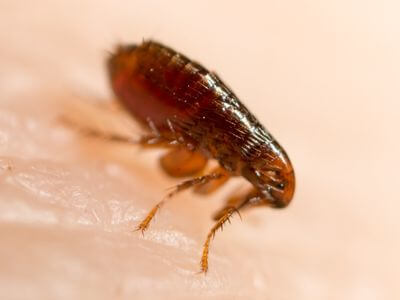
What Do Fleas Look Like?
Fleas are tiny, flightless parasites that feed on the blood of warm-blooded animals. They are about 1/12 to 1/6 of an inch in size. Fleas have brown, flat bodies with two antennae and six legs. They do not possess wings, although their strong legs allow them to jump long distances. Adult fleas are covered with bristles that point backward. Despite their small size, fleas can typically be seen by the naked eye.
What are the Signs of a Flea Infestation?
While pet owners are initially at risk for flea infestations, these biting pests can also be brought onto a property by wild animals like raccoons, squirrels, rabbits, or rodents. The most common species is the cat flea, which often feasts on cats, dogs, and humans. If you suspect a flea problem, check your pet, the inside of your home, and the outdoors where your pet commonly spends its time.
Bed bugs hide in dark, tightly packed spaces and crevices. Despite their name, they will live in more than just your bed; they will be in box springs, bed frames, carpeting, and other furniture. The most common signs of a bed bug infestation are droppings, bites, blood smears, skin shells, and odor.
Inspecting Your Pet for Fleas
If your pet is scratching frequently, restless, irritable, or starting to lose their hair, that is the first sign that your animal has fleas. We suggest using a flea comb to comb through your pet’s hair. Fleas can typically be found around the neck area, groin area, leg folds, and tail base. Any fleas found can be disposed of by putting them in soapy water.
Inspecting Indoors for Fleas
Fleas indoors are not a pleasant experience. They tend to gather in areas where you sleep or relax. Common places to find fleas include bedding, your pets’ sleeping areas, carpets, and furniture. Check the areas where your pet usually hangs out, as well as parts of your bed or furniture where pets jump on and off. Look for live adult fleas and their feces, which appear as dark specks of dirt.
Inspecting Outdoors for Fleas
If you find fleas on your pet, there’s a good chance you may also have a flea infestation in your yard. One helpful tip is to wear long white socks when inspecting the yard. Shuffle your feet in specific areas like flowerbeds, around trees, and mulch beds, and then shine a light on your socks to check for fleas. Fleas will be more visible on white socks. Keep in mind that shaded areas, such as under trees and porches, tend to have the highest concentration of fleas.
Are Fleas Harmful?
Fleas are a pet owner’s worst nightmare. Their bites are not only painful and itchy but may also cause allergic reactions in some people and transmit diseases. Fleas have an extremely high reproduction rate; a single female can produce up to 500 offspring in just three months. If not controlled immediately, a small problem can quickly turn into a full-blown flea infestation.
Professional Flea Control in Milwaukee, WI
Fleas are highly prolific and difficult insects to eradicate. Over-the-counter pesticides or DIY methods will not work against fleas. If you suspect or discover fleas, contact the pest control professionals at Advanced Wildlife and Pest Control for proper and effective flea control. Flea control is an ongoing battle. Consistent vacuuming, cleaning, and maintenance are required to effectively eliminate a flea infestation. Contact our flea exterminators today!
